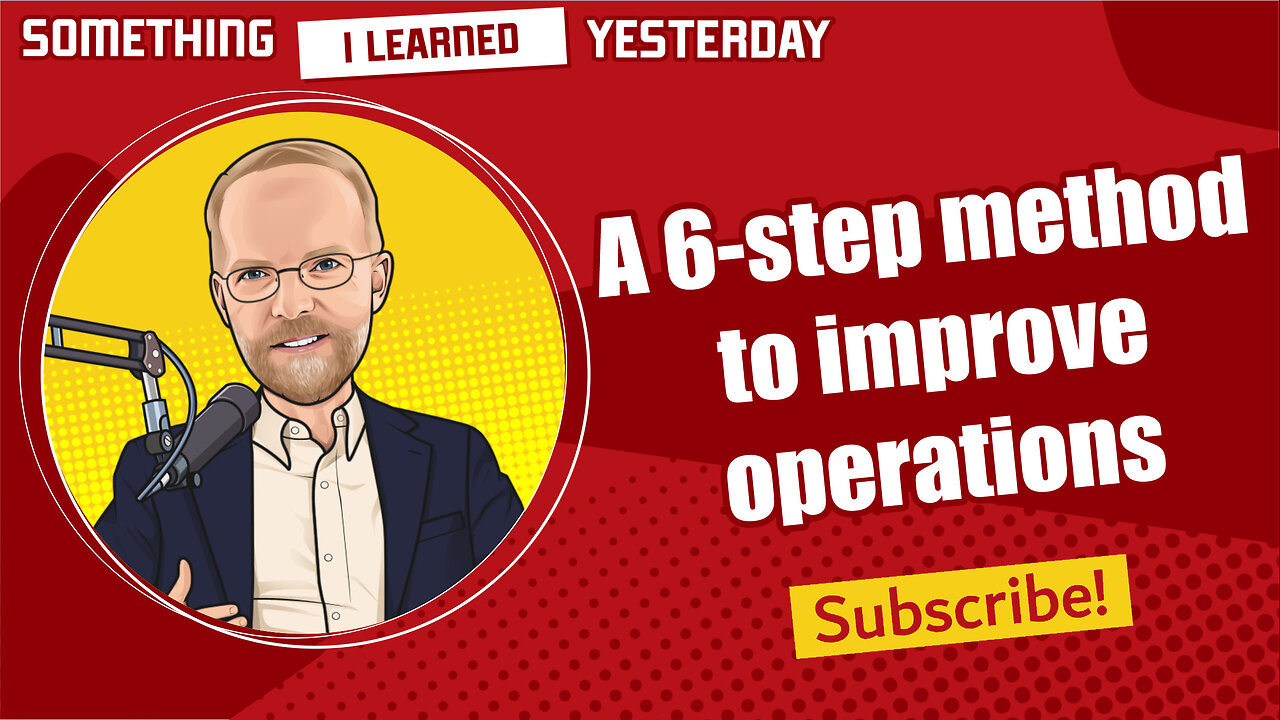Premium Only Content

182: A no cost, 6-step way to improve your operations
"Eat your own cooking."
"The cobbler's son has no shoes."
"Physician, heal thyself."
"Take your own medicine."
There are a lot of sayings that follow that same theme, and I think they're so popular because it's a fairly universal problem. Everyone is good at giving recommendations, but few of us are good at taking them. Even from ourselves.
Jordan Peterson says we should treat ourselves as someone we're responsible for. Or, in other words, we should apply the same sort of critical scrutiny to our own actions that we would apply to someone who came to us for help.
How do you apply that in your business?
Let’s say someone came to you with a complaint that their email marketing isn’t doing as well as it used to. You’d probably have a list of suggestions for them to consider. But do you apply those to your own email marketing?
None of us are expert in everything, and we can’t rely on the occasional plea for help from a colleague to prompt us to reconsider our techniques. We need to be more proactive and thoughtful about it. So here’s a simple method.
Pick some activity you’re involved in that you wish you could do better at.
Step 1: Forget about what you do – your own operations and limitations. Set all that aside. Keeping your own operations in mind will distort the way you look at the issue. You’ll make excuses, and you’ll limit the things you’re willing to consider.
Step 2: Come up with a list of sources for advice on the topic. That could include …
YouTube videos
White papers
Blogs
Conversations with your favorite AI tool
Groups on Reddit
Step 3: Spend some focused time digging into these resources – preferably in a new place. Not in your office. Again, don’t think of your own operations. Imagine you’ve been asked to give a presentation on the topic, or write a white paper.
Take notes, and don’t worry too much about organizing them. This is the information-gathering stage.
Continue to do that until you feel like you’ve heard everything there is to hear, and it starts to get repetitive.
Step 4: Forget about it. Put it aside. Spend a day at the park. Sleep on it. Distract your conscious mind from the problem so your unconscious mind can work on it.
Step 5: Once again, get out of your office. You don’t want your thoughts to be encumbered by the routine. Review your notes and organize them into an outline. You’ll be surprised at the extra little insights that will occur to you, that can fill in and expand on your outline. During Step 4, your brain was making connections and working on all the things you gathered in Step 3. You’ll find new ways to organize and synthesize the information.
Step 6: Now go back to your office, take your outline and compare it with what you’re doing.
-
 46:08
46:08
Kimberly Guilfoyle
3 hours agoBad Day to be a Bad Guy: FBI Taking Down World’s Worst Criminals, Live with John Nantz | Ep.203
27.4K8 -
 DVR
DVR
Redacted News
2 hours agoWhat's REALLY going on in Syria? | Redacted with Natali Morris
40.4K32 -
 54:18
54:18
Candace Show Podcast
3 hours agoHarvey Speaks: Jessica Mann & The Five Year Affair | Ep 3
27.6K8 -
 56:53
56:53
Grant Stinchfield
1 hour ago $0.59 earnedFreeze Spending & Kick the Can Down the Road... Why Republicans Should do Just That!
6.42K3 -
 56:48
56:48
VSiNLive
2 hours agoFollow the Money with Mitch Moss & Pauly Howard | Hour 1
6.81K -
 LIVE
LIVE
Barry Cunningham
3 hours agoTRUMP DAILY BRIEFING: INTERNET UNDER ATTACK! X & RUMBLE DOWN! EXECUTIVE ORDER SIGNING!
1,210 watching -
 DVR
DVR
Scammer Payback
6 hours agoCalling Scammers Live
30K2 -
 1:36:15
1:36:15
In The Litter Box w/ Jewels & Catturd
1 day agoABOLISH NGOs | In the Litter Box w/ Jewels & Catturd – Ep. 758 – 3/10/2025
54.7K37 -
 2:04:36
2:04:36
Film Threat
19 hours agoVERSUS: DAREDEVIL: BORN AGAIN + MICKEY 17 + THE STATE OF SCI-FI | Film Threat Versus
17.5K1 -
 1:21:46
1:21:46
The HotSeat
3 hours agoIt's A Trap America! Do Not Fall For It!
12.7K7